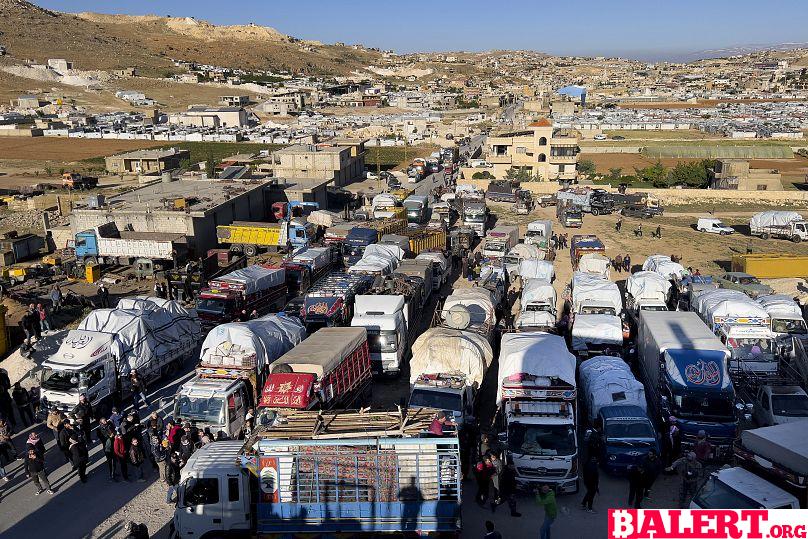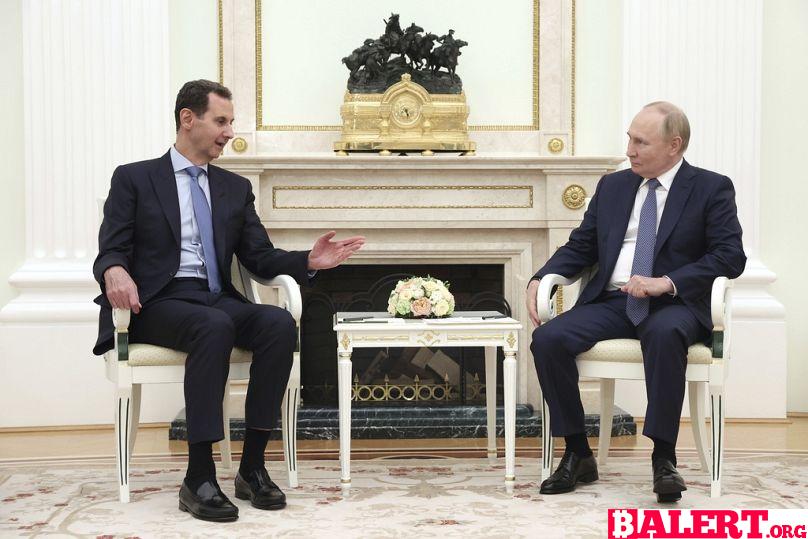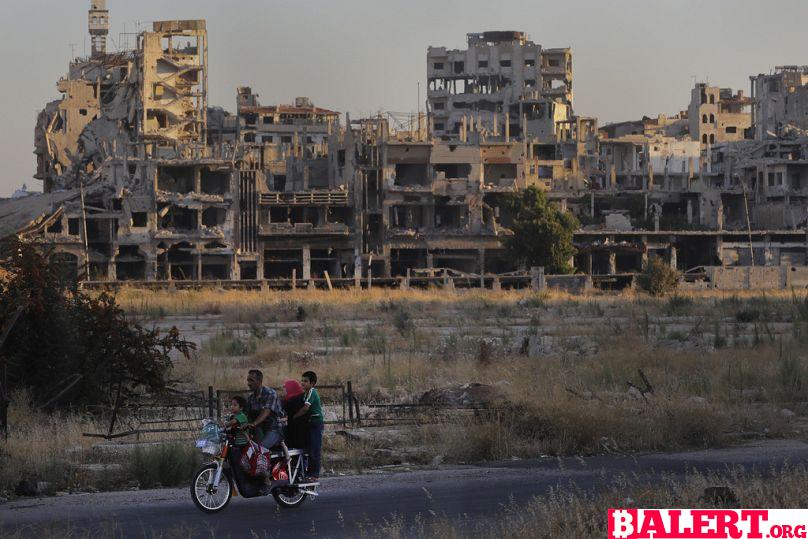World
The Dangers of Normalising Relations with Assad: A Cautionary Perspective
Explore the potential risks and consequences of normalising relations with Assad’s regime. This cautionary perspective delves into political, social, and humanitarian implications, urging critical examination of the path forward.

Reflections on the Consequences of Normalising Relations with Assad

Having witnessed the devastating repercussions of conflict, genocide, and forced displacement in the Balkans, I find myself grappling with disbelief each time a proposal emerges to normalise relations with a dictator who has perpetuated a decade-long war characterized by repression, ethnic cleansing, and severe war crimes. The recent call by Italian Foreign Minister Antonio Tajani and his Austrian counterpart Alexander Schallenberg for a shift in Europe’s strategy towards Syria — specifically advocating for the normalisation of relations with Bashar al-Assad’s regime — is particularly troubling.

Their statements, published in the Italian media, align with the sentiments of six other nations — Cyprus, the Czech Republic, Greece, Slovakia, and Slovenia — all facing mounting domestic pressures to respond to the rising influx of refugees into Europe. These proposals are set to be discussed in a meeting of all 27 EU member states on September 13.
Having been informed by Bosnia’s painful history and dedicating years to studying the Syrian crisis, I must caution against the disastrous consequences that would result from normalising relations with al-Assad. Such a move would be detrimental, particularly regarding the return of refugees and the stability of Europe. Legitimising a regime that has systematically annihilated its own population and poses an ongoing threat to both the Syrian people and European security would likely lead to an escalation of refugee flows towards European borders, not a reduction.
It’s Not Just About the Economy
The rationale presented by the eight European governments suggests that normalising relations with al-Assad could somehow facilitate the return of Syrian refugees, thereby alleviating pressure on Europe. This argument is fundamentally misguided. Syrian refugees are not mere economic migrants who can be enticed back with promises of aid and reconstruction. They are individuals who fled unimaginable violence, torture, and repression at the hands of the al-Assad regime. Any proposal to repatriate refugees to Syria under al-Assad’s rule disregards the reality that many of these individuals are perceived as enemies by the very government that Europe seeks to engage with.
Al-Assad’s regime has made it abundantly clear that it has no intention of welcoming back refugees, especially those who opposed it or escaped from regime-controlled territories. The regime has implemented various laws that enable it to confiscate the properties of displaced Syrians, labelling them as “terrorists” or “traitors.” According to repeated surveys conducted by the Syrian Association for Citizens Dignity, over 70% of displaced Syrians would prefer to risk their lives attempting to reach Europe rather than accept a return to al-Assad-controlled Syria.
Moreover, recent decrees, including one issued in November 2023, allow the regime to seize the assets of dissidents, further discouraging any potential return. A report from UNHCR in 2023 indicated that less than 1.1% of Syrian refugees expressed a willingness to return to Syria under the current conditions. They demand safety, freedom from arbitrary detention, access to livelihoods, and resolution of issues surrounding detainees—all of which the al-Assad regime has shown no interest in addressing. Any efforts to coerce or even encourage refugees to return to al-Assad-controlled areas would inevitably lead to renewed cycles of displacement.
There Can’t Be Any ‘Safe Zones’ If Violence Never Stops
As someone from Bosnia, it is alarming to hear well-informed insiders propose that one of the central strategies championed by several European and non-European states, as well as international organisations, is the establishment of “safe zones” within al-Assad-held Syria for the return of Syrian refugees.
On the surface, this may appear to be a practical solution to Europe’s migration concerns. However, in reality, the notion of safe zones in al-Assad-controlled territories is a perilous illusion. We witnessed firsthand in Bosnia how the concept of safe zones can fail catastrophically. The international community declared Srebrenica a safe zone, only to witness the horrifying massacre of 8,000 men and boys by Bosnian Serb forces. The international community’s failure to protect those seeking refuge there should serve as a lasting lesson on the limitations of such zones, especially in regions where the very forces responsible for war crimes maintain control.
Forcing refugees back into al-Assad-controlled areas under the guise of “safe zones” would not only violate their fundamental human rights but also trigger new waves of displacement. Many Syrians would opt to flee once more rather than live under al-Assad’s brutal regime. In Syria, the complexity of the situation is even more pronounced. Although al-Assad’s regime may formally control vast territories, key areas are under the influence of Iranian-backed militias, Hezbollah, and Russian forces. These are not regions of stability or safety; they are militarized zones where civilians live in constant fear. Violence, arbitrary arrests, and detentions remain rampant in al-Assad-controlled areas, rendering the establishment of safe zones within these territories not only unrealistic but also unethical.
Furthermore, in areas like Daraa, which have ostensibly “reconciled” with the regime, violence has never ceased; in fact, it is escalating. Residents continue to face threats, repression, and new waves of displacement. Refugees returning to these areas are not returning to safety; they are returning to insecurity, intimidation, and the ever-present possibility of renewed violence. This rising violence is currently spreading to other areas, including Homs and Sweida.
Related
- With the Syria crisis underfunded, it’s time to rethink how donors provide aid
- Normalising al-Assad’s regime is dangerous and must be abandoned
The situation in Daraa, where the head of the Military Security Branch of the regime’s forces recently threatened to convert the town into a “Gaza-like situation,” should serve as a stark warning to Europe about the perils of relying on al-Assad to ensure security for returning refugees.
Forcing refugees back into al-Assad-controlled areas under the pretense of “safe zones” would not only violate their basic human rights but also lead to new waves of displacement. Many Syrians would choose to flee again rather than endure al-Assad’s oppressive rule. Consequently, Europe could face renewed refugee flows, this time comprising Syrians who have been compelled to return to an unsafe homeland. Such a scenario would only exacerbate the refugee crisis that European leaders are so eager to resolve.
The Dangers of Normalising al-Assad
Normalising relations with al-Assad would have extensive repercussions, not just for Syria but for Europe as well. Al-Assad has demonstrated no willingness to engage in meaningful political reform, accountability for war crimes, or respect for human rights. Instead, he has relied on the backing of Iran and Russia to maintain his grip on power while continuing to oppress his citizens.
The push toward normalising relations with al-Assad is not merely misguided—it is perilous. Advocates argue that normalisation would promote stability in Syria and facilitate economic recovery. However, this argument overlooks the fundamental nature of al-Assad’s regime. He has survived not because he is a capable leader devoted to the welfare of his people, but because he has ruthlessly crushed any opposition, starved his populace into submission, relied on the manufacturing and smuggling of Captagon, and depended on external actors—namely Russia and Iran—to prop up his regime.
Thirteen years of international engagement, from the “Four Baskets” to the Constitutional Committee to “Step for Step” to Arab normalisation, have all produced the same outcome: al-Assad has refused to make any concessions. He has no motive to alter course now.
Normalising relations with al-Assad would not usher in stability; it would entrench a corrupt, brutal dictatorship. The al-Assad regime has systematically weaponised humanitarian aid, diverting it to loyalists and using it to further its military objectives. The regime has no intention of political reform or national reconciliation. Thirteen years of international engagement have yielded no progress; al-Assad has consistently rebuffed any attempts at meaningful dialogue.

What Should Europe Do?
So, what should Europe’s strategy towards Syria entail? First, Europe must uphold its commitment to sanctions and the diplomatic isolation of the al-Assad regime until genuine, verifiable changes occur on the ground. Such changes should include the release of political prisoners, an end to arbitrary arrests and torture, and the establishment of conditions allowing for the safe, voluntary, and dignified return of refugees. Any discussions regarding reconstruction aid should be contingent upon progress in human rights and accountability for war crimes.
Second, Europe must continue to support the efforts of international organisations that document war crimes and build cases for future prosecutions. Just as the ICTY was instrumental in holding perpetrators accountable in the Balkans, future justice mechanisms will be crucial for Syria. Addressing the issues of detainees and accountability for crimes remains paramount for the vast majority of displaced Syrians.
Finally, Europe should reject the notion of creating “safe zones” in al-Assad-controlled territories and instead focus on supporting refugees where they currently reside. This necessitates increasing assistance for host countries like Turkey, Lebanon, and Jordan while simultaneously leveraging its political influence to elevate the creation of a genuinely safe environment for all Syrians to the forefront of the political dialogue in Geneva.
There is one point on which Tajani, Schallenberg, and I can agree: Europe stands at a critical crossroads in its approach to Syria. It can either opt for the normalisation of the Syrian regime and the establishment of “safe zones” in al-Assad’s Syria, thereby preparing for new waves of Syrian refugees inevitably seeking safety in Europe, or it can steadfastly commit to human rights, justice, and accountability, initiating the difficult work of convening a genuine political process aimed at establishing a truly safe environment for all Syrians. Only one of these paths reflects not only a moral obligation to the millions of displaced Syrians but also serves Europe’s best interests.
Refik Hodžić is a transitional justice expert, former ICTY spokesperson, and former Communications Director of the International Center for Transitional Justice.
At Euronews, we believe all views matter. Contact us at view@euronews.com to send pitches or submissions and be part of the conversation.
World
Dominique Pelicot Testifies in Harrowing Rape Trial
Join us as Dominique Pelicot courageously testifies in a harrowing rape trial, shedding light on the complexities of trauma and justice. Her powerful story raises crucial questions about the legal system and the importance of support for survivors.

Dominique Pelicot Takes the Stand in Shocking Rape Trial
In a courtroom drama that has captivated France and garnered international attention, Dominique Pelicot, the man at the center of a harrowing rape trial, finally addressed the court. With tears streaming down his face, he recounted how his wife had been instrumental in helping him cope with a tumultuous past marked by trauma. He revealed that he had endured a sexual assault at the tender age of nine while hospitalized, and he also witnessed a gang rape during his teenage years while working as an apprentice electrician on a construction site.
“She didn’t deserve this, I acknowledge that,” Mr. Pelicot stated, his voice barely audible as he struggled to convey his emotions. The gravity of the situation weighed heavily on him, and the courtroom fell silent, straining to catch his every word.
Now 71 years old, Mr. Pelicot faces serious allegations of drugging his wife, Gisèle Pelicot, whom he has been married to for half a century, over a span of nearly ten years. Prosecutors contend that he used drugs to render her comatose, allowing him to rape her repeatedly. Furthermore, authorities allege that he went so far as to invite numerous men into their home, facilitating a nightmarish scenario where they, too, engaged in the assault of his wife.
Overall, 51 men, including Mr. Pelicot, are on trial concurrently, primarily facing charges related to the aggravated rape of Ms. Pelicot. Among them, one individual has already pleaded guilty to similar crimes, admitting to drugging his own wife to assault her and inviting Mr. Pelicot to partake in the horrific act while she was incapacitated.
Mr. Pelicot’s unexpected testimony came after a tumultuous start to the trial. Just a week in, he was stricken with severe health issues that forced him to miss four consecutive days in court. The head judge ultimately decided to postpone proceedings, as Mr. Pelicot was diagnosed with kidney stones, a kidney infection, and prostate complications, adding yet another layer of complexity to this already harrowing case.
World
Meta Bans Russian State Media Outlets from Social Media Platforms
Explore the implications of Meta’s decision to ban Russian state media outlets from its social media platforms. Understand the impact on information dissemination and the ongoing battle against misinformation in the digital landscape.

Meta Imposes Global Ban on Russian State Media Outlets
In a significant move, Meta Platforms, Inc., the parent company of Facebook, has announced the prohibition of Russian state media outlets, including RT (Russia Today) and Rossiya Segodnya, from all its social media platforms. The decision stems from the company’s concerns regarding the deceptive strategies employed by these media organizations to execute covert influence operations across the internet.
Meta made this announcement on Monday, emphasizing that the ban will be enforced worldwide across its various platforms, such as Instagram, WhatsApp, and Threads. The rollout of this ban is expected to take place over the coming days.
Statement from Meta
A spokesperson for Meta elaborated on the decision, stating, “After careful consideration, we have expanded our ongoing enforcement actions against Russian state media outlets. As a result, Rossiya Segodnya, RT, and other affiliated entities are now banned from our applications globally due to their involvement in foreign interference activities.”
For further insights into this development, watch the video in the player above.
World
Trump Recalls Alleged Assassination Attempt While Golfing
Explore Donald Trump’s chilling recollection of an alleged assassination attempt he experienced while enjoying a round of golf. Delve into the tense moments and his reflections on safety, fame, and the unpredictability of public life.

In a recent interview on the social media platform X, Republican presidential nominee Donald Trump recounted a harrowing incident he claims to have experienced while playing golf. Trump described how, during a peaceful Sunday morning round with friends, the tranquility of the day was abruptly shattered by the sound of gunfire in the air.
“It was a beautiful day, everything was just perfect,” Trump reflected. “Then all of a sudden, we heard shots being fired—probably around four or five in total.” He went on to explain that a Secret Service agent was the first to spot the suspect, who was allegedly armed with an AK-47, a powerful assault rifle.
“The agent saw the barrel of the weapon and immediately took action, returning fire at the barrel and aiming in the direction of the bushes,” Trump detailed. “I would have loved to have sunk that last putt, but we decided it was best to leave the scene promptly.”
Trump expressed his gratitude towards the agents and a vigilant civilian who aided in tracking down the suspect, who was eventually apprehended following a high-speed chase.
Suspect Faces Multiple Federal Gun Charges
The FBI has identified the suspect as Ryan Wesley Routh, accusing him of targeting Trump during his time at the golf club in West Palm Beach, Florida. According to an FBI report, Routh had allegedly hidden among the hedges of the golf course for an astonishing 12 hours. Authorities discovered an SKS-style assault rifle, a GoPro camera, and a bag of food at the scene.
The 58-year-old Routh is now facing two serious federal gun charges. If convicted on both counts, he could face a combined maximum sentence of 20 years in prison. Notably, neither of the charges is directly related to an assassination attempt. The first charge pertains to possessing a firearm despite a prior felony conviction, which carries a potential 15-year sentence, a fine of $250,000 (€225,000), and three years of supervised release.
The second charge involves possession of a firearm with an obliterated serial number, which could result in a five-year prison term, the same financial penalties, and also three years of supervised release. As the investigation continues, additional charges could be forthcoming.
While the motive behind Routh’s actions remains unclear, his digital footprint reveals strong political affiliations, particularly concerning issues surrounding Ukraine and China. Routh consistently expressed support for Ukraine across various social media platforms, even claiming to have orchestrated a recruitment scheme for international volunteers aiming to assist Ukraine in its fight against Russia’s invasion. This behavior has been denounced by Ukrainian soldiers and members of the International Legion, who disavowed Routh’s actions and motives.
-

 Business7 months ago
Business7 months agoThe Significance of Jackson Hole: A Central Banking Tradition
-

 Tech6 months ago
Tech6 months agoNew Leaks and Features About the Samsung Galaxy S25 Ultra
-

 Article9 months ago
Article9 months agoCreative Design Applications Developed with Artificial Intelligence
-

 Business6 months ago
Business6 months agoBhutan’s Strategic Investment in Bitcoin: A New Era for the Himalayan Kingdom
-

 Business8 months ago
Business8 months agoObituary: Dan Collins
-

 World6 months ago
World6 months agoThierry Breton Resigns: Impact on European Union Leadership
-

 Gaming6 months ago
Gaming6 months agoNew Details and Trailer Released for Dead Rising Deluxe Remaster
-

 Gaming6 months ago
Gaming6 months agoNew Details for Alan Wake 2 and PlayStation 5 Pro Announcement












